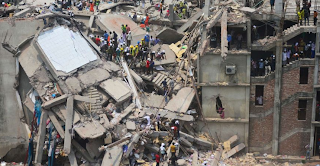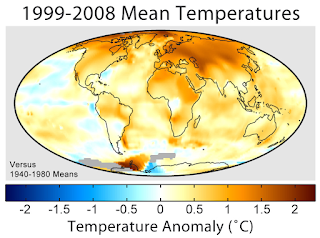Living seated on a mountain of corpses
Dhaka. Thousands people are working into the building full of the chaos, materials, machinery and finished products. For a miserable salary hours of intense work, suffocating atmosphere and no hope for a better future; their future is working for survive themselves and their sons. In a building made without accurate, oversaturated of workers, machines and merchandises, it is manufacturing the western dream of products cheap, beautiful and without responsibility.
But one fateful day the dream was truncated. The advertisement of engineers, noise of structure and movements of building didn’t serve, responsible of the production didn’t want to lose time and money; and suddenly building took away the life of more one thousand people. But actually these thousands and millions people of the so-called in developing countries haven’t life for so long.
But one fateful day the dream was truncated. The advertisement of engineers, noise of structure and movements of building didn’t serve, responsible of the production didn’t want to lose time and money; and suddenly building took away the life of more one thousand people. But actually these thousands and millions people of the so-called in developing countries haven’t life for so long.
The industrial revolution in the XVIII century appeared redistributes human labor. Usually people associate industry with factory, but this isn’t true because of factories and workshops have been ever since. The industrial revolution is a change in the way of working. Until then the factories and workshops had got people with trade, in others words the only unskilled labor was the children who had entered as apprentice, the unskilled labor could only work on the arms jobs which is to picking crops or carrier things. But in the XVIII century technological improvement coupled with a rationalization of the work (basis of the industrial revolution) opened the door of the factory in unskilled labor, leaving the few skilled jobs that could not be done by machine a few officers and the work force was leaving to an army of unskilled workers cheaper. Obviously unskilled workers tended to leave the country by the factory, not so charge more but to have a regular job gave security that they had in rural environment.
Originally the new industry lacked the existence of a potential consumer market. The cheapening due to the replacement of the official well-paid by workers underpaid and increased production only repelled the pocket of the owner. However give a scarce security to workers made that they dare to buy which increasing market, and a growing demand for skilled workers in factories. This happy combination lasts until the market is saturated, but doesn’t matter, in the XVIII and XIX downing wages and redounding people, problem was solved within the industry, but poverty increased in streets.
At the end of the XVIII century riots was becoming in revolution in France. Much has been written of the French Revolution, but the summary is: After humiliation of Utrecht France begin an expansionist policy in Africa and America to support and recover its position in Europe due to meltdown that means to lost the Spanish Succession War. This will carry to France in the mid-eighteenth century a new war against England (the Great War or seven years), with a distribution similar to the international forces of Spanish Succession, and same result: total defeat of France. So Louis XVI inherited a bankrupt state. It is said that Louis XVI was the preparation of the Bourbon kings they still manage fatal crisis, increased taxes, reduced social spending, but kept costs from their point of view were essential as the military and pomposity (it seems anti-crisis political of current countries). The final result was the head in a basket.
The story tells of a town before the Bastille demanding freedom when in fact demanding bread and work. Who really demanded freedom was the new enterprise class caught between a crisis, arbitrary and unfair policies, and the impossibility to make influence. The revolution failed because it does not solve the issue of hunger and solve the crisis of Napoleon's expansionist policy. During the XIX century the new industrial bourgeoisie was already allowing participated of the power, leaving the workers to their fate, this century was becoming in the century of riots and rebellions.
The life of a factory worker is similar to that of a slave in the Roman Empire. You can be fired simply because a manager wants to employ an acquaintance, the pay is miserable, the day is endless and treatment is degrading. This is the time of Dickens and Victor Hugo where they and other realistic writers describe the world where people with no bowels lose dignity and humanity to collect the little misery that was giving out. But the last great revolution in 1917 will change everything. It will be precisely the grueling German employers of Prussian nature who invented the basis of what we now call the Welfare State, they create retirement, universal healthcare and vacations; not by altruism but to stop socialism, they should think "if they can do us also".
Humanity has arrived at XXI century with communism dead and the economy globalized. These two events are neither good nor bad as such, although those who have shaped the current state of things. In the Roman Empire already arrived species of extreme orient and it found objects from Europe to China almost prehistoric times that is proving of global trade has always existed; but the speed and cost of this trade today does that everyone can sell anything anywhere in the world. On the other hand, the apparent lack of alternative kills possible hope go out of the well, so to spend effort to get out of the well when there is only a pit, and what they do is fight for a better position in the well.
And in this context we export to third world our nineteenth century with the promise that eventually they would live like us. The third world has become legion of unskilled workers who populate the factories, as then produce cheap items for the upper classes that we had become Western citizens. As in the cities of the XIX century, our cities are the streets of rich people were there are nice boulevards, beautiful buildings and elegant shops, while the cities of the Third World were very poor industrial suburbs described by Dickens, which didn’t see the residents of wealthy neighborhoods that were still together. At present the global tourism carries us to these cities of poverty but our eyes see them as a decoration attractions park.
A morning like many others greed killed more than a thousand workers, but day by day this slavery is killing in factories or mines around the world without the media makes attention. However that morning the shops opened their lights and offer their products including which have made few days before for the dead workers. The sad thing is that it happened a month and nobody remembered the fact, but it isn’t still visible, hidden by the neon lights and the sterile environment of the store, it’s dripping the blood of thousands of workers in this and other factories that makes the miracle. Miracle as their lives is thrown away at the end of the season.
As a coda. When you see your neighbor's beard shaved makes your soak. I just warning.




Comentaris
Publica un comentari a l'entrada